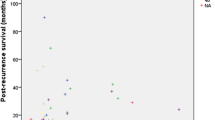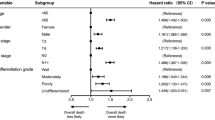Abstract
This study aimed at investigating the survival rate and prognostic factors of laryngeal carcinoma patients in the absence of the use of laryngectomy, radiotherapy, and chemotherapy. A total of 167 cases of laryngeal carcinoma without the use of laryngectomy, radiotherapy, or chemotherapy were analyzed retrospectively. Surveyed items included age, smoking history, tumor family history, tuberculosis history, primary site, pathological grade, T-stage, N-stage, clinical stage, and whether tracheotomy had been performed. Survival rates were calculated using the Kaplan–Meier method. For univariate analysis, comparison among/between groups was performed using the log-rank test. Multivariate analysis was carried out using the Cox proportional hazard model. Overall median survival time was 16 ± 1.44 months, and overall 1- and 2-year survival rates were 56.4 and 26.5%, respectively. No patient survived over 5 years in cases diagnosed for more than 5 years (except for cases that were lost). The median survival time of clinical stage 0/I/II was 28 ± 3.81 months, and 1- and 2-year survival rates were 79.3 and 59.3%, respectively; the median survival time of III/IV clinical stages was 11 ± 1.32 months, and 1- and 2-year survival rates were 45.5 and 10.6%, respectively. Univariate analysis showed that primary site, pathological grade, T-stage, N-stage, and clinical stage were significant prognostic factors for the survival of the patients (P < 0.05). Whether tracheotomy had been performed was not significant for affecting survival rates. Multivariate analysis showed survival rates were statistically correlated with T-stage and N-stage (P < 0.05). The development of laryngeal carcinoma course was faster, without treatment to the tumor itself, even if palliative surgery such as tracheostomy would not improve the survival rate. In laryngeal carcinoma patients with no surgery, radiotherapy or chemotherapy, the factors affecting the survival rates include primary site, pathological grade, T-stage, N-stage, and clinical stage, and of them, T-stage and N-stage are the independent prognostic factors.






Similar content being viewed by others
References
Danic D, Maruĭć M, Uzarević B et al (2000) Prognostic factors in squamous cell carcinoma of the larynx. ORL J Otorhinolaryngol Relat Spec 62(3):143–148
Nguyen-Tan PF, Le QT, Quivey JM et al (2001) Treatment results and prognostic factors of advanced T3–4 laryngeal carcinoma: the University of California, San Francisco (UCSF) and Stanford University Hospital (SUH) experience. Int J Radiat Oncol Biol Phys 50(5):1172–1180
Papadas TA, Alexopoulos EC, Mallis A et al (2010) Survival after laryngectomy: a review of 133 patients with laryngeal carcinoma. Eur Arch Otorhinolaryngol 267(7):1095–1101
Rudolph E, Dyckhoff G, Becher H et al (2011) Effects of tumour stage, comorbidity and therapy on survival of laryngeal cancer patients: a systematic review and a meta-analysis. Eur Arch Otorhinolaryngol 268(2):165–179
Jing J, Zhong Xing L, Li G et al (2002) Analysis of prognostic factors for T1N0M0 glottic cancer treated with definitive radiotherapy alone: experience of the cancer hospital of Peking Union Medical College and the Chinese Academy of Medical Sciences. Int J Radiat Oncol Biol Phys 54(2):471–478
Haugen H, Johansson KA, Mercke C (2002) Hyperfractionated-accelerated or conventionally fractionated radiotherapy for early glottic cancer. Int J Radiat Oncol Biol Phys 52(1):109–119
Back G, Sood S (2005) The management of early laryngeal cancer: options for patients and therapists. Curr Opin Otolaryngol Head Neck Surg 13(2):85–91
Spector GJ, Sessions DG, Lenox J et al (2004) Management of stage IV glottic carcinoma: therapeutic outcomes. Laryngoscope 114(8):1438–1446
Holsinger FC, Lin HY, Bassot V et al (2009) Platin-based exclusive chemotherapy for selected patients with squamous cell carcinoma of the larynx and pharynx. Cancer 115(17):3909–3918
Chijiwa H, Sato K, Umeno H et al (2009) Histopathological study of correlation between laryngeal space invasion and lymph node metastasis in glottic carcinoma. J Laryngol Otol Suppl 123(31):48–51
Forastiere AA (2010) Larynx preservation and survival trends: should there be concern? Head Neck 32(1):14–17
Hoffman HT, Porter K, Karnell LH et al (2006) Laryngeal cancer in the United States: changes in demographics, patterns of care, and survival. Laryngoscope 116(111):11–13
Olsen KD (2010) Reexamining the treatment of advanced laryngeal cancer. Head Neck 32(1):1–7
Conflict of interest
There is no financial relationship with the organization that sponsored the research.
Author information
Authors and Affiliations
Corresponding author
Rights and permissions
About this article
Cite this article
Yu, Q., Zhang, X., Ji, C. et al. Survival analysis of laryngeal carcinoma without laryngectomy, radiotherapy, or chemotherapy. Eur Arch Otorhinolaryngol 269, 2103–2109 (2012). https://doi.org/10.1007/s00405-011-1873-7
Received:
Accepted:
Published:
Issue Date:
DOI: https://doi.org/10.1007/s00405-011-1873-7




